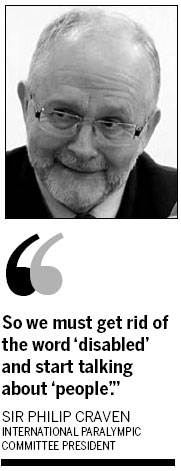Craven: There is nothing disabled about us
China's media is now focused on disabled people as the Asian Para Games involving thousands of disabled athletes are taking place in Guangzhou, Guangdong province.
But International Paralympic Committee (IPC) President Philip Craven wants the media to stop using the word "disabled" and says that all of these athletes are "people", the same as anyone else.

"The word itself means nothing good because disabled is like a broken motor. That's what the word means. So we must get rid of the word 'disabled' and start talking about 'people'," said the British official during an exclusive interview with China Daily.
"Don't use it. Forget it. Throw it into the garbage bin," he said.
"No country in the world has got the right overall attitude toward people with a perceived disability. Disability is a perception, not a truth," said Craven, who has used a wheelchair since breaking his back in a mountaineering accident. He went on to become a great wheelchair basketballer.
"The fact my legs don't work is irrelevant as my wheels are twice as good as people's legs," he said.
Craven represented England in wheelchair basketball at five Paralympic Games from 1972 to 1988. He also competed in track and field and swimming at the 1972 Games.
Even though he is now busy with Paralympic development, he still loves sports and is trying to watch as much as possible during his visit to Guangzhou.
He said wheelchair sports were his favorite, but he also enjoys other sports.
"Now I'm the president of IPC, I have to understand and enjoy 26 sports. And I do enjoy them all," he said. "But, of course, I feel a bit more passion for wheelchair basketball.
"I am registered to play at home with my local team - in the third division, not in the top division. Unfortunately, I am often away from home and miss lots of matches. But I still play a little."
Craven said events such as the Paralympic Games in Beijing and the Asian Para Games in Guangzhou play significant roles in developing the para sports movement.
But he asked that people not focus only on the medal tally, adding that topping the medal table does not guarantee "success".
"I do not believe 'success' is about the medal tally," Craven said. "Officially there is no medal table. The media creates the medal table.
"A nation might achieve success on the court or in the pool but it's what happened before and mainly what happens after the games that is important.
"The legacy to society is more important, making the legacy accessible to everyone. We are not talking about accessibility for the disabled. We are talking about accessibility for all. Education for all. Employment for all. That's how it should be."
Craven, 60, is still energetic and looking to develop Paralympic sports over the next few years.
"The key to the sustainable development of Paralympic sports is for it to take place in local communities. Get these sports played at the local level.
"For example, you have schools where you have two or three children who have to use a wheelchair or are partially sightless. Maybe they cannot play sports in their school. Why not create a club outside school where kids can come together from several schools and play sports?
"It's important to make sport local for children so they can have fun, and for them to have choices so they can find a sport they can do.
"That's how it should be in the future - not only in China but all over the world."
 0
0 






